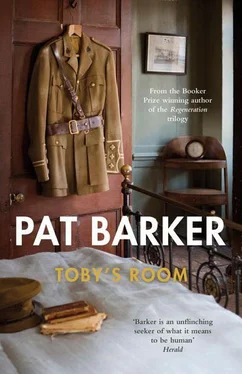They carried on sitting in the firelight, as motionless as flies in amber, until the crash of a collapsing log jolted Paul into speech. ‘Why couldn’t you tell Elinor that?’
‘The disgrace.’
‘I doubt if she’d see it like that.’
‘No, but her parents would, their friends would. Let’s face it, Tarrant, everybody would — except for a few nancy boys in bloody Bloomsbury. I thought it was right to spare his family and I still think it’s right. He blew his brains out to save them from it, so what do you think gives me the right to come back to London and start blabbing?’
There were hollows in the fire now. As Paul watched, a ridge of coals fell and Neville’s face was plunged into shadow.
‘You could have made something up.’
‘Lies, you mean?’
‘If need be.’
‘You don’t lie to people you respect.’
‘You could’ve told Elinor the truth.’
‘Are you going to tell her?’
‘I don’t know. Probably.’
‘Well, you know her better than I do.’ After a few seconds, he went on: ‘I can’t make any sense of him, you know. He was one of the most compassionate — no, not “one of” — the most compassionate man I’ve ever known. And he was also completely inhumane.’
‘I suspect some of the saints were a bit like that.’
‘Didn’t go in for buggering boys in stables though, did they?’ He took another swig from his glass. ‘Or, anyway, if they did it’s not recorded.’
Paul waited for more but Neville seemed to be sinking into a semi-comatose state. It was late, the dead of night, and, though the shutters continued to bump, he thought the wind might be dying down. ‘If you don’t mind,’ he said, ‘I think I’ll turn in.’
‘No, you go on up. I won’t be long.’
As he left the room, Neville was leaning forward to throw another log on the fire.
Paul went to bed and tossed and turned for an hour before finally slipping into a threadbare sleep. He dreamt of a desolate landscape in which nothing moved except for a black shape on the horizon, which rose and fell, rose and fell like an arm beckoning, while a bloated sun swelled to fill half the sky.
When he woke it was light. He went across to the window, pulled the blackout curtains to one side, and looked out. Sunlight and clear, cold air on his face. The lifeboat wasn’t back, but the storm was over. The sea threw up huge sullen swells that petered out in little runnels and ripples of foam before they reached the first ridge of shingle.
He wanted to get out into the sunshine, forget the darkness of the previous evening. As he was getting dressed, it occurred to him that he hadn’t heard Neville come upstairs last night. Well, that wasn’t surprising, he’d probably stayed up drinking, Paul would have been asleep by the time he finally came to bed. All the same …
Before going downstairs he stood outside Neville’s bedroom door and listened, but there was no sound. For a second he wondered if he should push the door open and check on him, but no, he was being ridiculous. Neville would quite rightly resent the intrusion.
Downstairs, he opened the living-room door. The room told its own story. Lamp left on, bottle empty, a glass overturned beside Neville’s chair. The kitchen showed no sign that anybody had been there since the previous night. Neville was having a lie-in, and no wonder. Paul tried to remember how much had been left in the bottle when he’d gone to bed. Too much.
He buttered a slice of stale bread, took a slightly wizened russet apple from a bowl on the sideboard, and wandered out on to the path. The lifeboat was being winched up the beach. He stopped to watch and then went back into the house, increasingly concerned about Neville, who was ill, after all. When the doctors let him out to convalesce, they hadn’t had drinking sessions like last night’s in mind.
His bed hadn’t been slept in. That left his studio, which would be, presumably, on the second floor. Paul pushed doors open till he found it. Neville wasn’t there either. Paul was about to withdraw, but then his eye was caught by the painting on the easel. Normally he wouldn’t have dreamt of looking at somebody else’s unfinished work, but from the glimpse he’d had of this, he knew he had to see more.
No wonder Neville had seemed so preoccupied with what the censor would allow, because he’d been painting the moment of death, the only subject more strongly discouraged than corpses. The figure at the centre of the composition was being blown backwards by the force of an unseen explosion, while behind him on the horizon a grotesquely fat sun, a goblin of a sun, was eating up the sky.
Paul knew he was looking at the moment of Toby Brooke’s death, though not exactly as Neville had related it. There was no revolver here. Well, fair enough, Neville was under no obligation to stick to the facts. Whatever ‘the facts’ were. Now that he was better rested and able to think more clearly, Paul wasn’t sure how much of Neville’s story he believed. Oh, Neville had set out to tell the truth — he didn’t doubt that for a moment — but was it possible that, in the end, he’d ducked out of revealing something too dreadful to be told?
Paul backed out of the room and closed the door quietly behind him. There came a time when you simply had to let it go and accept an approximation of the truth, and he’d reached that moment now. Two men set out into No Man’s Land; one man came back. That was all anybody else knew, or would ever know.
Downstairs, the front door opened. Neville was back.
‘Where’ve you been?’ Paul said.
‘The doctor’s. You said you’d seen him, I thought I ought to go and say how sorry I was about Ian.’
Paul leaned over the banisters. Neville was standing in the hall, holding a loaf of bread and a bottle of milk. He looked surprisingly fresh. Invigorated, almost. Suddenly, Paul felt that any anxiety about this man was not merely unnecessary but stupid. Look at him; just look at him. Whoever else went under, Kit Neville would survive.
Paul arrived at the station early in a cold drizzle and sat down to wait for the train from Sidcup. When it drew in he got to his feet and searched for Elinor among the grey-black hurrying figures. She was wearing a lavender-coloured hat; it cheered him to see her bobbing along, though the face she turned up to him was sharp, hungry for information.
All that day he’d been thinking about what Neville had said, only a few minutes before Paul had left for London.
‘For God’s sake, man. Brooke blew his brains out so his family didn’t have to know. Do you really think he’d want you to tell Elinor? No, he made his choice, and the least you can do is respect it.’
Paul wouldn’t have dreamt of telling Brooke’s parents, or his older sister, for that matter. Knowing how he’d died would only cause them additional pain and they’d already had to endure so much. But then, couldn’t the same be said of Elinor? He didn’t know. He took her in his arms, put his lips to her cold, damp cheek, and still he didn’t know.
‘We can go next door, to the hotel,’ he said.
She shook her head. ‘No, I’ve been stuck in a hut all day, I could do with some fresh air.’
They began walking down Villiers Street towards the river. A dank stench came off the water, mingling with the sulphurous smell of the fog that had been thickening since morning.
He asked how her day had been.
‘Oh, not bad. I enjoy it, you know. I never thought I would, but I do …’
They turned left on to Victoria Embankment.
‘I’ve said I’ll do another day. Tonks is going to France at the end of January, so they want me to do a bit more.’
Читать дальше












